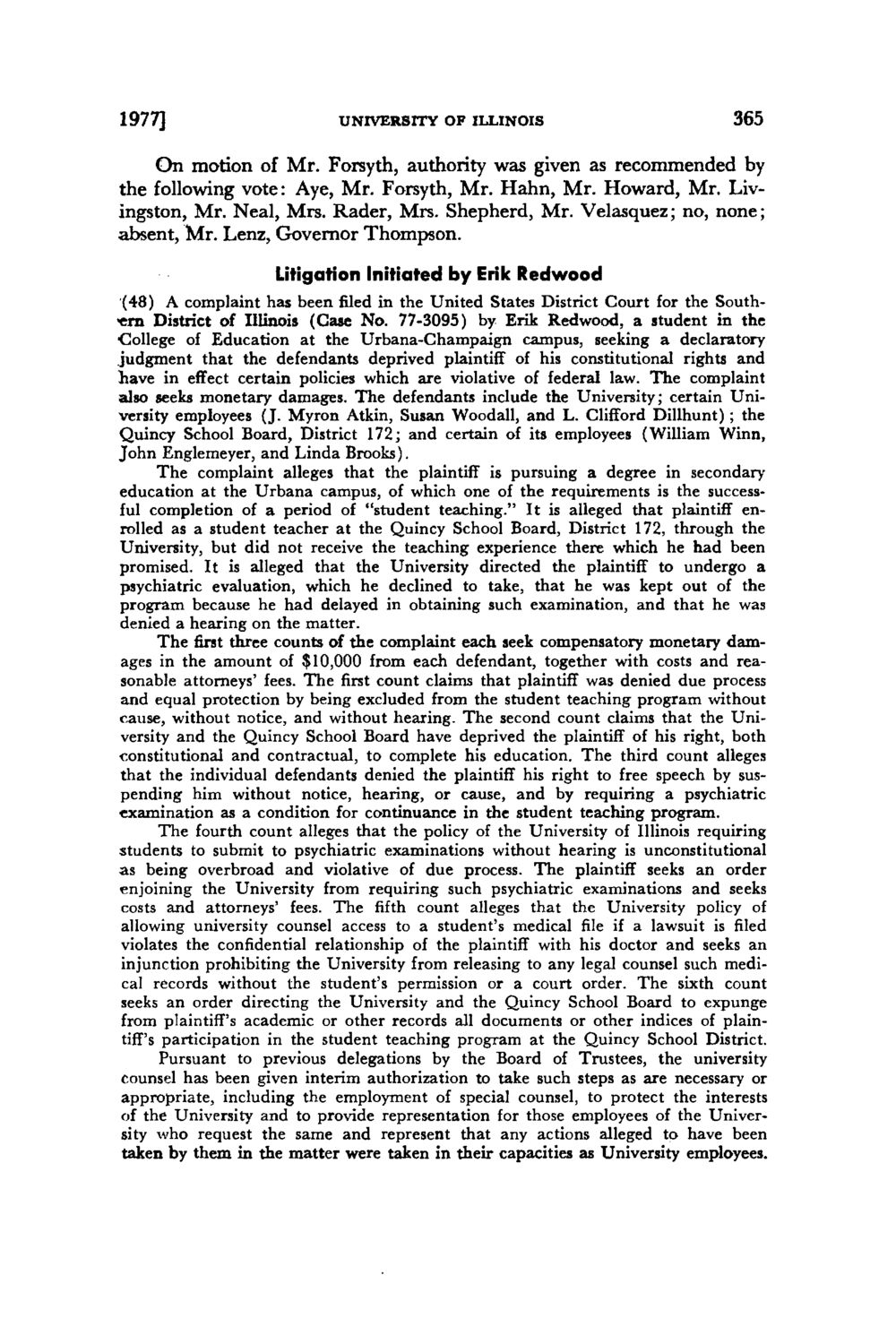| |
| |
Caption: Board of Trustees Minutes - 1978
This is a reduced-resolution page image for fast online browsing.

EXTRACTED TEXT FROM PAGE:
1977] UNIVERSITY OF ILLINOIS 365 On motion of Mr. Forsyth, authority was given as recommended by the following vote: Aye, Mr. Forsyth, Mr. Hahn, Mr. Howard, Mr. Livingston, Mr. Neal, Mrs. Rader, Mrs. Shepherd, Mr. Velasquez; no, none; absent, Mr. Lenz, Governor Thompson. Litigation Initiated by Erik Redwood (48) A complaint has been filed in the United States District Court for the Southe r n District of Illinois (Case No. 77-3095) by Erik Redwood, a student in the College of Education at the Urbana-Champaign campus, seeking a declaratory judgment that the defendants deprived plaintiff of his constitutional rights and have in effect certain policies which are violative of federal law. The complaint also seeks monetary damages. The defendants include the University; certain University employees (J. Myron Atkin, Susan Woodall, and L. Clifford Dillhunt) ; the Quincy School Board, District 172; and certain of its employees (William Winn, John Englemeyer, and Linda Brooks). T h e complaint alleges that the plaintiff is pursuing a degree in secondary education at the Urbana campus, of which one of the requirements is the successful completion of a period of "student teaching." I t is alleged that plaintiff enrolled as a student teacher at the Quincy School Board, District 172, through the University, but did not receive the teaching experience there which he had been promised. It is alleged that the University directed the plaintiff to undergo a psychiatric evaluation, which he declined to take, that he was kept out of the program because he had delayed in obtaining such examination, and that he was denied a hearing on the matter. T h e first three counts of the complaint each seek compensatory monetary damages in the amount of $10,000 from each defendant, together with costs and reasonable attorneys' fees. The first count claims that plaintiff was denied due process and equal protection by being excluded from the student teaching program without cause, without notice, and without hearing. The second count claims that the University and the Quincy School Board have deprived the plaintiff of his right, both constitutional and contractual, to complete his education. The third count alleges that the individual defendants denied the plaintiff his right to free speech by suspending him without notice, hearing, or cause, and by requiring a psychiatric examination as a condition for continuance in the student teaching program. The fourth count alleges that the policy of the University of Illinois requiring students to submit to psychiatric examinations without hearing is unconstitutional as being overbroad and violative of due process. The plaintiff seeks an order enjoining the University from requiring such psychiatric examinations and seeks costs and attorneys' fees. The fifth count alleges that the University policy of allowing university counsel access to a student's medical file if a lawsuit is filed violates the confidential relationship of the plaintiff with his doctor and seeks an injunction prohibiting the University from releasing to any legal counsel such medical records without the student's permission or a court order. The sixth count seeks an order directing the University and the Quincy School Board to expunge from plaintiff's academic or other records all documents or other indices of plaintiff's participation in the student teaching program at the Quincy School District. Pursuant to previous delegations by the Board of Trustees, the university counsel has been given interim authorization to take such steps as are necessary or appropriate, including the employment of special counsel, to protect the interests of the University and to provide representation for those employees of the University who request the same and represent that any actions alleged to have been taken by them in the matter were taken in their capacities as University employees.
| |